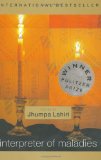
Navigating between the Indian traditions they've inherited and the baffling new world, the characters in Jhumpa Lahiri's elegant, touching stories seek love beyond the barriers of culture and generations. In "A Temporary Matter," published in The New Yorker, a young Indian-American couple faces the heartbreak of a stillborn birth while their Boston neighborhood copes with a nightly blackout. In the title story, an interpreter guides an American family through the India of their ancestors and hears an astonishing confession. Lahiri writes with deft cultural insight reminiscent of Anita Desai and a nuanced depth that recalls Mavis Gallant. She is an important and powerful new voice.
"Simply put, Lahiri displays a remarkable maturity and ability to imagine other lives...[E]ach story offers something special. Jhumpa Lahiri's Interpreter of Maladies will reward readers." USA Today, Ginia Bellafante.
"Lahiri's Interpreter of Maladies has a gift for illuminating the full meaning of brief relationships with lovers, family, friends..." - Time Out New York, Ariel Levy.
"The experience of being foreign and the need for connection both mark Lahiri's outstanding debut collection of short stories, Interpreter of Maladies, in which intimacy is often the odd consequences of her character's admitting how distant they have become, or always were." - The New York Times, Michiko Kakutani.
"There is not one false note here, not one misstep or hesitation....[E]ach of these nine stories has the capacity to amaze us..." - Newsweek, Laura Shapiro.
"Lahiri's language is uncluttered; she's sparing with metaphor, and the riches accumulate unobtrusively." - The New York Times Book Review, Caleb Crain.
"What makes Lahiri's debut collection of stories stand out is precisely its quality of unexpected ordinariness. Its not that these tales of Americanized Indians are themselves ordinary...It's the familiarity of the world Lahiri captures...that distinguishes ..." - Kirkus Reviews.
"Lahiri's touch in these nine tales is delicate, but her observations remain damningly accurate, and her bittersweet stories are unhampered by nostalgia." - Publishers Weekly.
This information about Interpreter of Maladies was first featured
in "The BookBrowse Review" - BookBrowse's membership magazine, and in our weekly "Publishing This Week" newsletter. Publication information is for the USA, and (unless stated otherwise) represents the first print edition. The reviews are necessarily limited to those that were available to us ahead of publication. If you are the publisher or author and feel that they do not properly reflect the range of media opinion now available, send us a message with the mainstream reviews that you would like to see added.
Any "Author Information" displayed below reflects the author's biography at the time this particular book was published.
Jhumpa Lahiri, a bilingual writer and translator, is the Millicent C. McIntosh Professor of English and Director of Creative Writing at Barnard College (Columbia University). She received the Pulitzer Prize in 2000 for Interpreter of Maladies, her debut story collection. She is also the author of The Namesake, Unaccustomed Earth, and The Lowland, which was a finalist for both the Man Booker Prize and the National Book Award in fiction. Since 2015, Lahiri has been writing fiction, essays, and poetry in Italian: In Altre Parole (In Other Words), Il Vestito dei libri (The Clothing of Books), Dove mi trovo (self-translated as Whereabouts), Il quaderno di Nerina, and Racconti romani. She has translated three novels by Domenico Starnone and is the editor of The Penguin Classics Book of Italian ...
... Full Biography
Author Interview
Name Pronunciation
Jhumpa Lahiri: JHOOM-paah L-hee-ree
The single biggest problem in communication is the illusion that it has taken place
Click Here to find out who said this, as well as discovering other famous literary quotes!
Your guide toexceptional books
BookBrowse seeks out and recommends the best in contemporary fiction and nonfiction—books that not only engage and entertain but also deepen our understanding of ourselves and the world around us.